 Software Tutorial
Software Tutorial
 Office Software
Office Software
 Word2010 tutorial: How to insert an updateable picture link into the document
Word2010 tutorial: How to insert an updateable picture link into the document
Word2010 tutorial: How to insert an updateable picture link into the document
How to insert an updateable picture link in a Word2010 document
Step 1, open the Word2010 document window, click the "Picture" button in the "Illustrations" group of the "Insert" ribbon.
Click the "Picture" button
Step 2, select the picture to be inserted into the Word2010 document in the "Insert Picture" dialog box that opens. Then click the drop-down triangle button to the right of the "Insert" button and select the "Insert and Link" command.
Select the "Insert and Link" command
The selected picture will be inserted into the Word2010 document. When the original picture content changes (the file has not been moved or renamed), reopening the Word2010 document will see that the picture has been updated (must reopen after closing all Word2010 documents) Open the Word2010 document with the inserted picture). If the original picture location is moved or the picture is renamed, the most recent picture version will be retained in the Word 2010 document.
Tips: If you select the "Link to File" command in the "Insert" drop-down menu, when the original picture position is moved or the picture is renamed, the picture will not be displayed in the Word2010 document.
How to use screenshots to insert pictures into documents in Word2010
1. First, you need to set the window to be intercepted not to be minimized, then open the Word2010 document page and click the "Insert" tab.
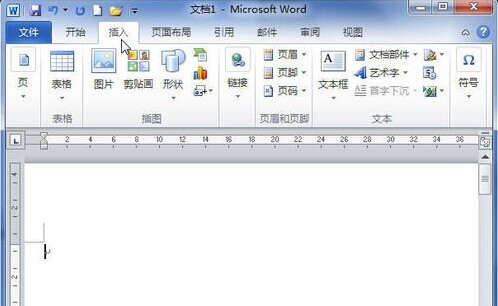
2. Then click the "Screenshot" button in "Illustrations".
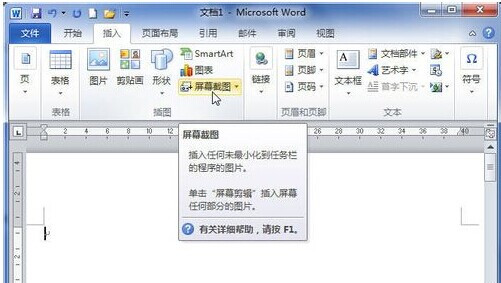
3. Select the captured window picture in the "Available Windows" small window. If there are multiple windows on the current screen that are not minimized, multiple pictures will be displayed in this small window.
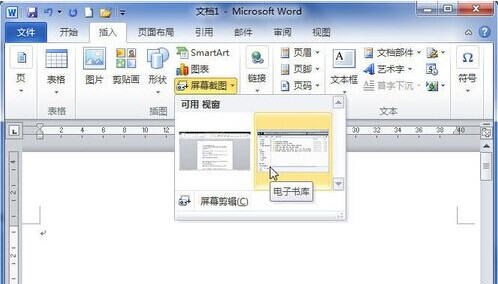
4. The selected window screenshot image will be automatically inserted into the current document.
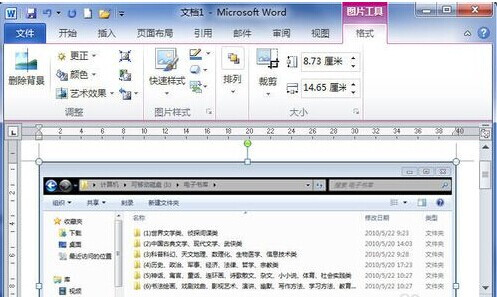
Method Two
1. You can also insert a part of any window on the screen as a picture into a Word2010 document. Display a window within the visible range, open the Word2010 document page, and click the "Insert" tab.
2. Click the "Screenshot" button in "Illustrations".
3. Select the "Screen Clip" command in the "Available Windows" small window.
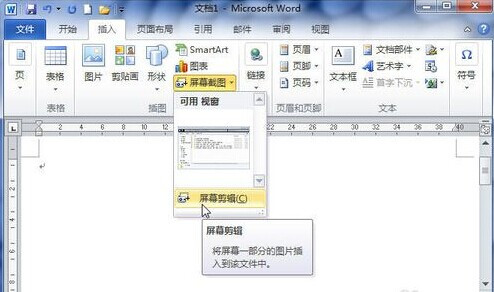
4. Drag the mouse to select a part of the active window and release the mouse. The selected part will be inserted into the Word2010 document page as a picture.
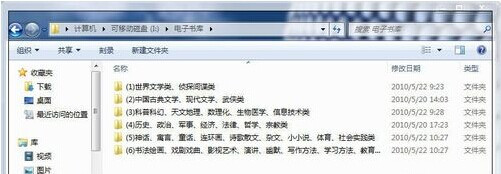
Precautions
Sometimes when using "Screenshot", the function always doesn't work at first. It is possible that the .doc document was opened with Word 2010 and "Compatibility Mode" is displayed in the title position, so this function cannot be used. It turns out that "Screenshot" is only available for Word2010 documents with the file extension .docx. This function cannot be used for .doc documents saved in Word2003.
How to apply picture preset effects in Word2010 documents
For pictures in Word2010 documents, users can rotate the selected pictures according to actual needs. There are three ways to rotate pictures in Word2010 documents. One is to use the rotation handle, one is to apply the preset rotation effect of Word2010, and the other is to enter the rotation angle value.
Steps/Method
1. Use the rotation handle to rotate the picture
If the rotation angle of the image in the Word2010 document is not precise, the user can use the rotation handle to rotate the image. First select the picture, a green rotating handle will appear above the picture. Move the mouse over the rotation handle, and the mouse cursor will take on the shape of a rotation arrow. Press and hold the left mouse button to rotate the picture clockwise or counterclockwise in the circumferential direction,
2. Apply Word2010 preset rotation effect
Word2010 presets 4 image rotation effects, namely rotating 90° to the right, rotating 90° to the left, flipping vertically and flipping horizontally. The operation steps are as follows:
Step 1, open the Word2010 document window and select the picture that needs to be rotated.
Step 2, in the "Format" tab of the "Picture Tools" ribbon, click the "Rotate" button in the "Arrange" group, and select "Rotate 90° to the right" in the opened rotation menu , "Rotate 90° to the left", "Flip vertically" or "Flip horizontally" effect, select the "Flip horizontally" effect
3. Enter the rotation angle value to rotate the image
Users can also specify specific numerical values to more accurately control the rotation angle of the image. The operation steps are as follows:
Step 1, open the Word2010 document window and select the picture that needs to be rotated. In the "Format" tab of the "Picture Tools" ribbon, click the "Rotate" button in the "Arrange" group, and select the "Other Rotation Options" command in the opened rotation menu, select the "Other Rotation Options" command
Step 2, switch to the "Size" tab in the "Layout" dialog box that opens, adjust the value of the "Rotation" edit box in the "Rotation" area, and click the "OK" button to rotate the picture. Enter the image rotation angle value
The above is the detailed content of Word2010 tutorial: How to insert an updateable picture link into the document. For more information, please follow other related articles on the PHP Chinese website!

Hot AI Tools

Undresser.AI Undress
AI-powered app for creating realistic nude photos

AI Clothes Remover
Online AI tool for removing clothes from photos.

Undress AI Tool
Undress images for free

Clothoff.io
AI clothes remover

Video Face Swap
Swap faces in any video effortlessly with our completely free AI face swap tool!

Hot Article

Hot Tools

Notepad++7.3.1
Easy-to-use and free code editor

SublimeText3 Chinese version
Chinese version, very easy to use

Zend Studio 13.0.1
Powerful PHP integrated development environment

Dreamweaver CS6
Visual web development tools

SublimeText3 Mac version
God-level code editing software (SublimeText3)

Hot Topics
 1670
1670
 14
14
 1428
1428
 52
52
 1329
1329
 25
25
 1276
1276
 29
29
 1256
1256
 24
24
 If You Don't Rename Tables in Excel, Today's the Day to Start
Apr 15, 2025 am 12:58 AM
If You Don't Rename Tables in Excel, Today's the Day to Start
Apr 15, 2025 am 12:58 AM
Quick link Why should tables be named in Excel How to name a table in Excel Excel table naming rules and techniques By default, tables in Excel are named Table1, Table2, Table3, and so on. However, you don't have to stick to these tags. In fact, it would be better if you don't! In this quick guide, I will explain why you should always rename tables in Excel and show you how to do this. Why should tables be named in Excel While it may take some time to develop the habit of naming tables in Excel (if you don't usually do this), the following reasons illustrate today
 How to change Excel table styles and remove table formatting
Apr 19, 2025 am 11:45 AM
How to change Excel table styles and remove table formatting
Apr 19, 2025 am 11:45 AM
This tutorial shows you how to quickly apply, modify, and remove Excel table styles while preserving all table functionalities. Want to make your Excel tables look exactly how you want? Read on! After creating an Excel table, the first step is usual
 Excel MATCH function with formula examples
Apr 15, 2025 am 11:21 AM
Excel MATCH function with formula examples
Apr 15, 2025 am 11:21 AM
This tutorial explains how to use MATCH function in Excel with formula examples. It also shows how to improve your lookup formulas by a making dynamic formula with VLOOKUP and MATCH. In Microsoft Excel, there are many different lookup/ref
 Excel: Compare strings in two cells for matches (case-insensitive or exact)
Apr 16, 2025 am 11:26 AM
Excel: Compare strings in two cells for matches (case-insensitive or exact)
Apr 16, 2025 am 11:26 AM
The tutorial shows how to compare text strings in Excel for case-insensitive and exact match. You will learn a number of formulas to compare two cells by their values, string length, or the number of occurrences of a specific character, a
 How to Make Your Excel Spreadsheet Accessible to All
Apr 18, 2025 am 01:06 AM
How to Make Your Excel Spreadsheet Accessible to All
Apr 18, 2025 am 01:06 AM
Improve the accessibility of Excel tables: A practical guide When creating a Microsoft Excel workbook, be sure to take the necessary steps to make sure everyone has access to it, especially if you plan to share the workbook with others. This guide will share some practical tips to help you achieve this. Use a descriptive worksheet name One way to improve accessibility of Excel workbooks is to change the name of the worksheet. By default, Excel worksheets are named Sheet1, Sheet2, Sheet3, etc. This non-descriptive numbering system will continue when you click " " to add a new worksheet. There are multiple benefits to changing the worksheet name to make it more accurate to describe the worksheet content: carry
 Don't Ignore the Power of F4 in Microsoft Excel
Apr 24, 2025 am 06:07 AM
Don't Ignore the Power of F4 in Microsoft Excel
Apr 24, 2025 am 06:07 AM
A must-have for Excel experts: the wonderful use of the F4 key, a secret weapon to improve efficiency! This article will reveal the powerful functions of the F4 key in Microsoft Excel under Windows system, helping you quickly master this shortcut key to improve productivity. 1. Switching formula reference type Reference types in Excel include relative references, absolute references, and mixed references. The F4 keys can be conveniently switched between these types, especially when creating formulas. Suppose you need to calculate the price of seven products and add a 20% tax. In cell E2, you may enter the following formula: =SUM(D2 (D2*A2)) After pressing Enter, the price containing 20% tax can be calculated. But,
 5 Open-Source Alternatives to Microsoft Excel
Apr 16, 2025 am 12:56 AM
5 Open-Source Alternatives to Microsoft Excel
Apr 16, 2025 am 12:56 AM
Excel remains popular in the business world, thanks to its familiar interfaces, data tools and a wide range of feature sets. Open source alternatives such as LibreOffice Calc and Gnumeric are compatible with Excel files. OnlyOffice and Grist provide cloud-based spreadsheet editors with collaboration capabilities. Looking for open source alternatives to Microsoft Excel depends on what you want to achieve: Are you tracking your monthly grocery list, or are you looking for tools that can support your business processes? Here are some spreadsheet editors for a variety of use cases. Excel remains a giant in the business world Microsoft Ex
 I Always Name Ranges in Excel, and You Should Too
Apr 19, 2025 am 12:56 AM
I Always Name Ranges in Excel, and You Should Too
Apr 19, 2025 am 12:56 AM
Improve Excel efficiency: Make good use of named regions By default, Microsoft Excel cells are named after column-row coordinates, such as A1 or B2. However, you can assign more specific names to a cell or cell range, improving navigation, making formulas clearer, and ultimately saving time. Why always name regions in Excel? You may be familiar with bookmarks in Microsoft Word, which are invisible signposts for the specified locations in your document, and you can jump to where you want at any time. Microsoft Excel has a bit of a unimaginative alternative to this time-saving tool called "names" and is accessible via the name box in the upper left corner of the workbook. Related content #



